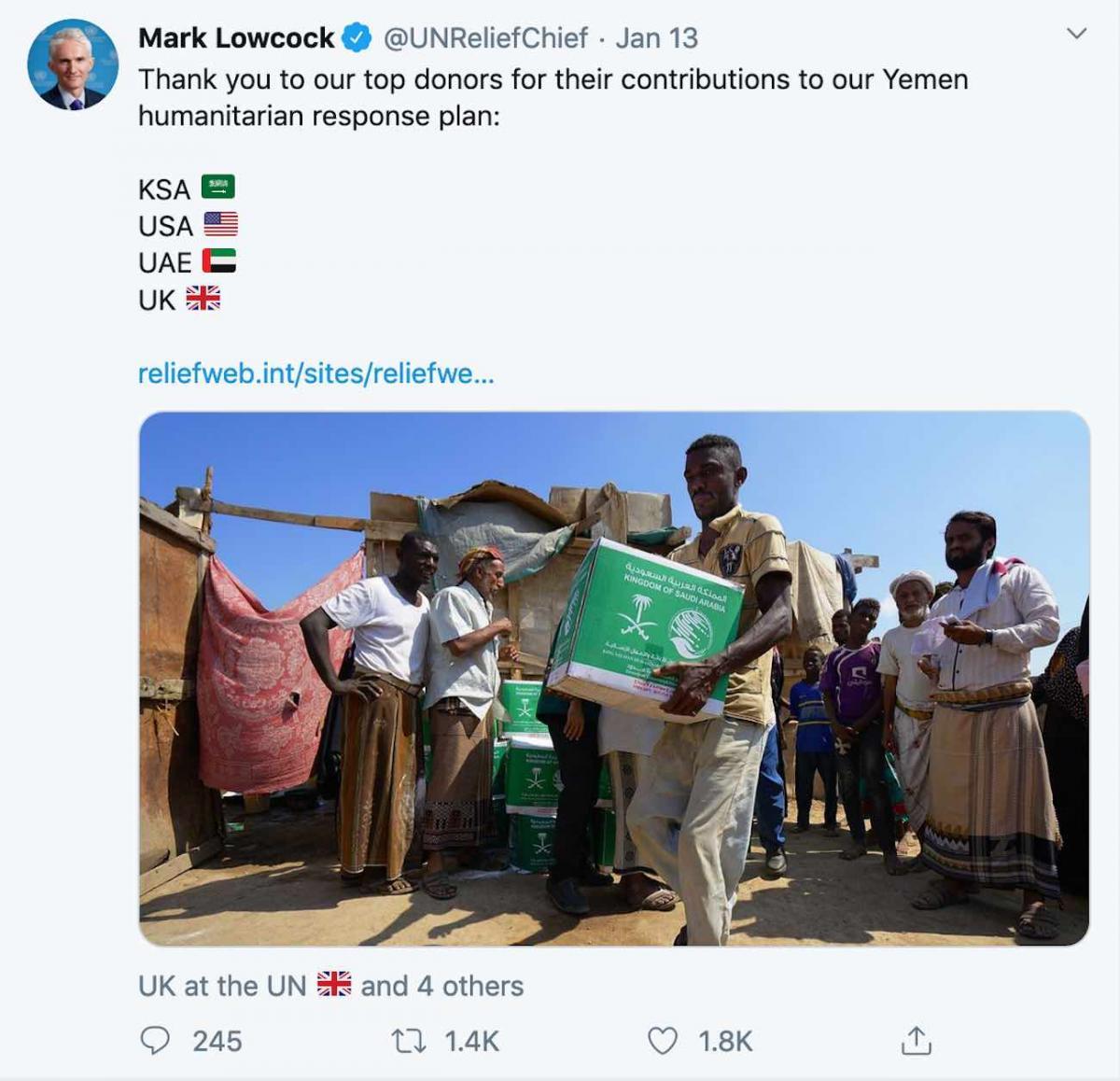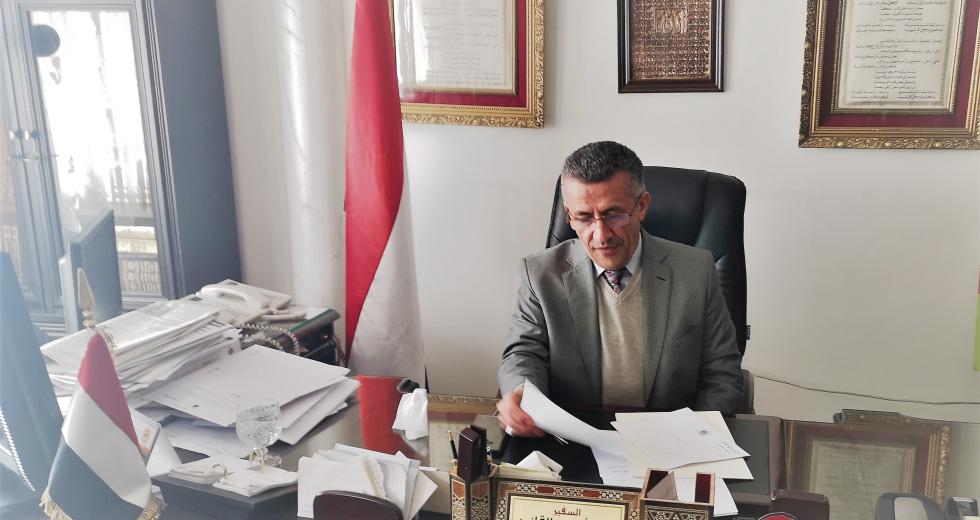
The US, UK-backed neo-colonialist war against Yemen enters its fifth year. The Saudi alliance of aggression has pulverised entire swathes of Yemeni territory, decimated infrastructure, bombed hospitals into oblivion - all with armaments and weapons systems supplied by the UK/US military industrial complex.
Despite the illegitimacy of this aggression, NATO member states and UN agencies have done little more than to offer lip-service to the inevitable dire “humanitarian” consequences of such a punitive war that collectively targets the Yemeni people and popular resistance movement, standing firm against decades of corrupt and resource-plundering Saudi/US/UK coalition occupation.
The West’s hypocrisy when shedding crocodile tears over the externally imposed humanitarian disaster in Yemen
In January of this year, as an example, UN Relief Chief, Mark Lowcock, thanked “top donors” to the “Yemen humanitarian response plan”. Without a trace of irony, Lowcock named the top four aggressors who have ensured Yemen is bombed back to the dark ages - UAE (United Arab Emirates), Saudi Arabia, US and UK.
The spokesperson for the Yemeni Health Ministry, Dr Yusef Al-Hadhree, explained in greater detail the hypocrisy of this statement from the UN Relief Chief:
The funds that the UN allocates to Yemen are provided by these four countries but we must understand some very basic elements.
First, Yemen’s resources - oil, gas and sea ports (except Hodeida) are controlled by these four countries. Therefore they are, effectively, able to fund their interventions in Yemen with our resources. At the same time, salaries for employees in Yemen have been cut since 2016 until today. The “humanitarian” funding from these countries has actually been stolen from the Yemeni people.
Second, the funds provided to the UN agencies are conditional. The UN is under obligation to conceal the crimes of the funding countries, committed in Yemen, which include the impact of the humanitarian blockade on the Yemeni people. The UN must provide political and media support for these countries through their international resolutions. The UN ensures these funds go to projects which do not directly benefit the Yemeni people, so the reality is - we see the deterioration of the humanitarian situation in Yemen year after year, despite these funds.
Third, the UN sought to transfer the Yemeni Central Bank from the Yemeni capital, Sanaa, to Aden, which is under the control of these four nations. The decision to do so was made in 2016. From that day until today, 80% of Yemeni people live without an annual government budget of $ 15 billion. While draining essential capital from our country, the UN boasts it is “helping” Yemen with $ 2 billion.
Fourth, 25-60% of these funds disappear as an “operating budget” for the UN-sponsored organisations and agencies and their leaders in Yemen and abroad. Yemen receives only the crumbs from their table. For example, the health sector plan in Yemen for 2019 was duly submitted to the UN. To date, only 19% has been implemented. There is a deficit of 81%. So why should we, the Yemeni people, listen to the UN bragging about the blood money of hostile states?
Fifth, the UN effectively has a duty to whitewash the image of these countries globally, portraying them as “humanitarians” despite their brutality and aggression towards the Yemeni people which is ongoing. These countries have committed heinous crimes in Yemen.
These countries besiege and starve the Yemeni people leaving us with thousands dead, many others suffering with curable diseases exacerbated by the blockade. We have countless civilians with chronic illnesses that we cannot treat, including cancer. Millions are suffering with psychological trauma. More than 20 million Yemenis are impoverished by the policies of these countries, 80% of the population.
Frankly, how does the UN dare talk about the “humanity” of these criminal countries?
Sixth, let us presume these countries provide $ 2bn dollars in “humanitarian aid” to Yemen. Saudi Arabia and UAE have spent more than $ 200bn to purchase American and British bombs and weapon systems to murder the Yemeni people. The same countries have squandered an estimated $ 2000 bn on the war against Yemen and the siege of the Yemeni people. Where is their “humanity” Lowcock?
Finally, the Yemeni people do not want this money or so-called “aid” from these criminal states. They want these countries to leave them in peace. Yemen possesses wealth and resources that will enable them to survive without such fraudulent “aid” which serves only to mislead public opinion in the West and to persuade the international community of the legitimacy of this genocidal aggression against Yemen.
Indeed, the UN ostensibly decries the starvation of children and widespread disease that thrives in the quagmire of Yemen’s war. However, the UN is complicit in the collective punishment of the Yemeni people in its continued adherence to Resolution 2216 which is based entirely upon the legitimacy of fugitive President Mansour Hadi who not only resigned in early 2015 but eventually fled to Riyadh where he called upon the Saudi regime to bomb the Yemeni people into submission. The UN effectively maintains the sadistic “humanitarian” blockade and sanctions on the Yemeni people.
This hybrid war against Yemen is one of the worst crimes against humanity of our lifetime.
The hidden role of Israel in the Saudi-led war of aggression against Yemen
Recently, I had the privilege to meet with and interview the Yemeni Ambassador in Damascus, Naif Ahmed Al Qanes. I had the opportunity to ask a few questions that are rarely discussed in a compromised Western media cartel that, like the UN, effectively conceals the ugly underbelly of the UK/US proxy neo-colonialist project in Yemen.
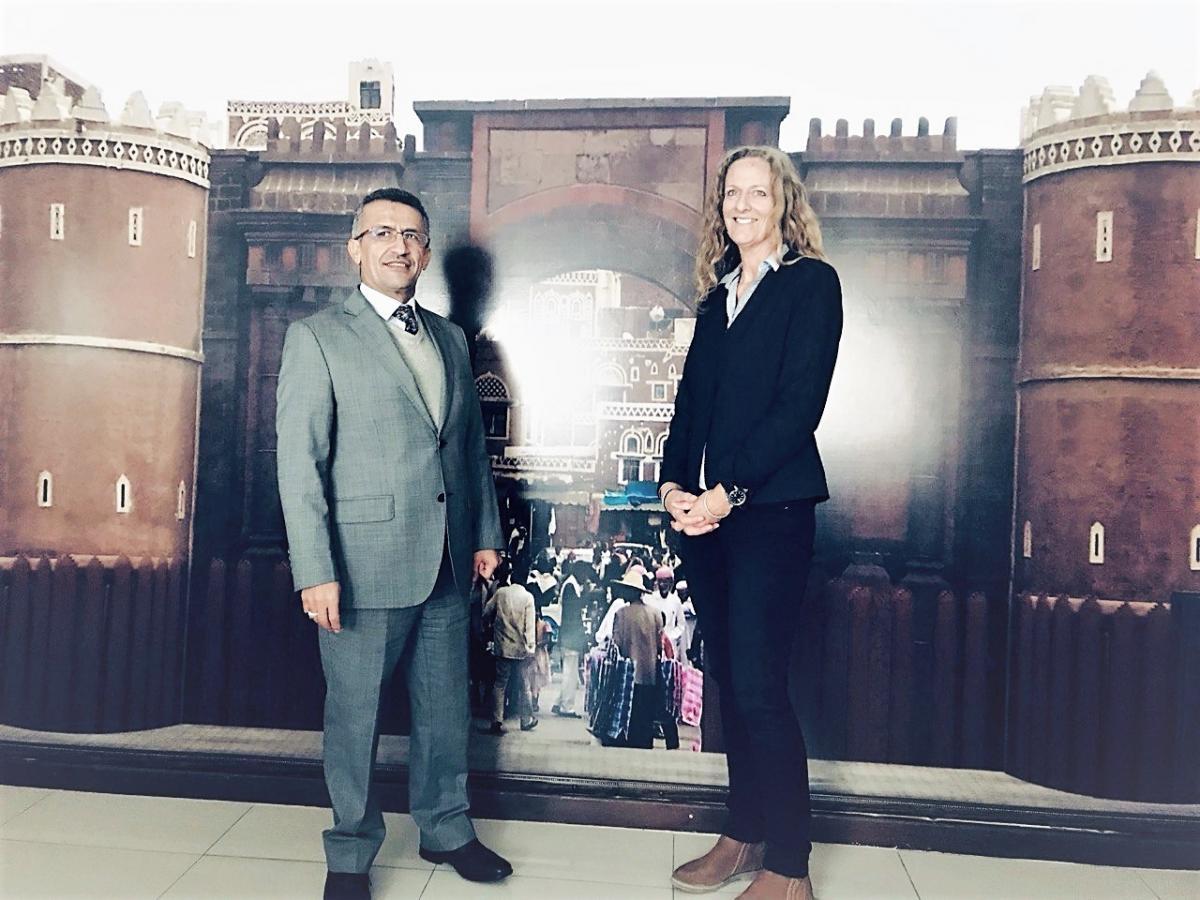
My first question addressed the involvement of Israel in the war against Yemen. The Ambassador replied in depth:
Israel has been present since the first day of the aggression against Yemen. Israeli pilots participated directly in targeting Yemeni air-defences to disable them and prevent their use in resisting this aggression.
Israel’s involvement has been ongoing. Their military experts and pilots are an integral part of the UK/US-backed Saudi coalition. Israel actually lost a number of their pilots in the targeting of our airbase in Asir.
The focus of the Israeli decision makers, research centers and Zionist intelligence agencies is related to the southern section of the Red Sea, the Bab-el-Mandeb straits. After some degree of normalisation with the Gulf States, Israel maintains a historic enmity with Iran. Israel perceives the Ansarullah popular resistance movement to be a proxy of Iran and their control of the Bab El Mandeb straits is tantamount to a stranglehold over the Zionist regime.
Israel already feels threatened by the envisaged Iranian expansionism in Iraq and Syria, the northern crescent, and is determined to prevent the perceived completion of the sphere of influence in the south, through Ansarullah.
Iran has control of the Hormuz Strait. If Iran gains control of the Bab el Mandeb straits then Iran would be the dominant regional force. An unacceptable situation according to the results of Zionist strategic studies and analysis. Such 'think tanks' are the guiding bodies for Israeli policy and decision makers and form the basis of Zionist regional ideology and strategy.
Israel will protect the Gulf States, in particular Saudi Arabia, to avoid Iranian supremacy. For this reason, Israel is participating in the genocidal war against Yemen.
The role of China in Yemen - has there been a change in policy?
My second question to the Ambassador was concerning recent discussions between the Yemeni Health Ministry and China which perhaps demonstrates a change in regional policy from China. China had previously been supplying drones to the Saudi alliance. The Ambassador replied:
Before we discuss China’s discussions with the Minister of Health, there are some very important variables to point out.
The change in Chinese policy is caused by the conditions forced upon them by American foreign policy.
Researchers and analysts of international relations are trying to come up with a specific theory to describe Trump’s foreign policy. Trump has gone beyond realism, liberalism and internationalism. He has bypassed all international theorism so these analysts are scrambling to define Trump’s ideology and policy decisions.
Trump’s aggressive economic strategy towards China has forced her to revise her global policy to protect herself.
The Chinese State Councillor, Wang Yi, made a statement on the 23rd November 2019 during the G20 meeting in Japan. He informed the Dutch Foreign Minister that 'The United States is broadly engaged in unilateralism and protectionism, and is damaging multilateralism and the multilateral trading system. It has already become the world’s biggest destabilizing factor.'
Wang Yi also claimed that the US has deliberately suppressed legitimate Chinese businesses and has laid groundless charges against them which is an act of intimidation and state-bullying. America is in the process of distorting China’s image worldwide.
I consider that these words from Wang Yi are indicative of the new Chinese political orientation.
We, in Yemen, are facing such an American distortion project since the beginning of the war of aggression against my country. That is why China will now deal with us from the perspective that 'the enemy of my enemy is my friend'.
There is another factor also. The US is currently weaponizing the Uighur extremists, present here in Syria and in China, against the Chinese government. The so-called 'human rights' of the Uighurs in China is being deployed to criminalise the Chinese government while the reality is that China is battling extremism fomented by the US, just as Syria has been fighting it for nine years.
America traditionally uses the Muslim Brotherhood as a destabilisation tool and in this case, the MB is being used to fuel such anti-China discourse internationally.
As an aside, I have noticed many reports that the US may be behind the spread of the Coronavirus. This is not as far-fetched as it may first appear. Saudi Arabia has been responsible for the various epidemics that have affected millions of Yemenis - the result of manufactured viruses.
Yemen’s allies in the axis of Resistance.
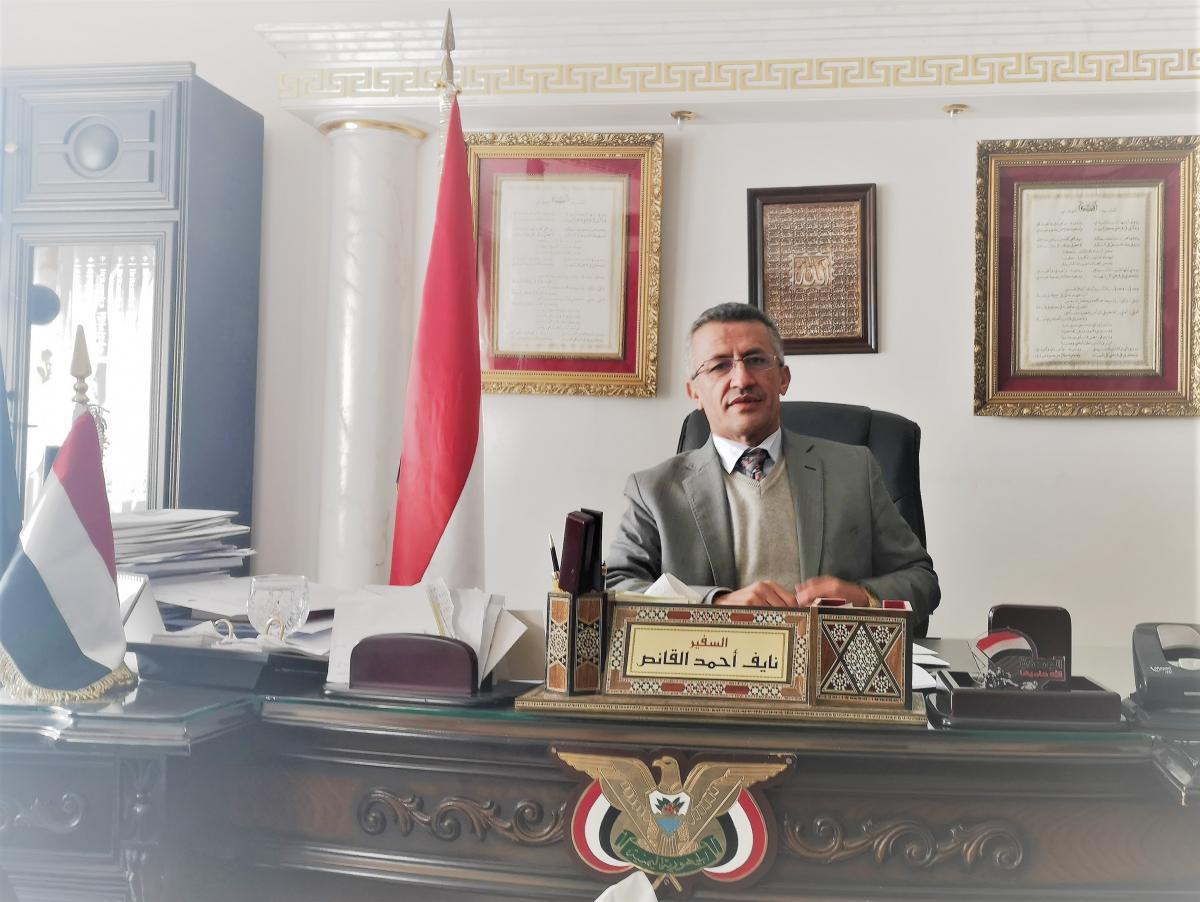
I asked the Ambassador which countries he considered to be allies of Yemen in their battle against the neo-colonialist projects led by the US, UK, Saudi Arabia, UAE and Israel. The Ambassador responded:
Yemen is fighting a war against a Gulf State coalition led by the US, UK, Israel and the EU. The same coalition that has been waging a war of aggression against Syria since 2011. These two criminal war projects are supported internationally despite the reality that they are nothing more than neo-colonialist campaigns aligned with international terrorist groups to achieve their destabilisation aims.
There has been a fundamental change in American policy. Previously the US would fight on behalf of her tools, now she deploys her tools to fight on behalf of the US and takes money in exchange for their engagement in wars orchestrated by the US.
Within this equation, we consider that the Axis of Resistance is our strategic ally. Even if not present with us on the battle frontlines, it is fighting the same enemy on other fronts as in Syria, for example.
Syria has confronted an international 'world war' on its territory. Hashd Al Shaabi in Iraq and Hezbollah in Lebanon, the genuine Palestinian resistance facing international Zionist terrorism and Iran is, for us, the leader of this axis. These are our strategic allies in the region and they provide logistic, moral and media support for the Yemeni resistance movement.
Our international allies are those who also challenge the imperialist projects in their countries - Venezuela, DPRK and all truly 'free' countries around the world. I believe the more countries that align to defeat imperialism, the weaker this project becomes.
Russia has a pivotal role inside Syria but has played no role in supporting Yemen. Of course, we hope that Russia will eventually balance their role throughout the region and will restore the much-needed equilibrium to all Arab nations and act as a necessary counter to the US-led supremacy and hegemony in our region.
The role of the UN in maintaining the “humanitarian” blockade.
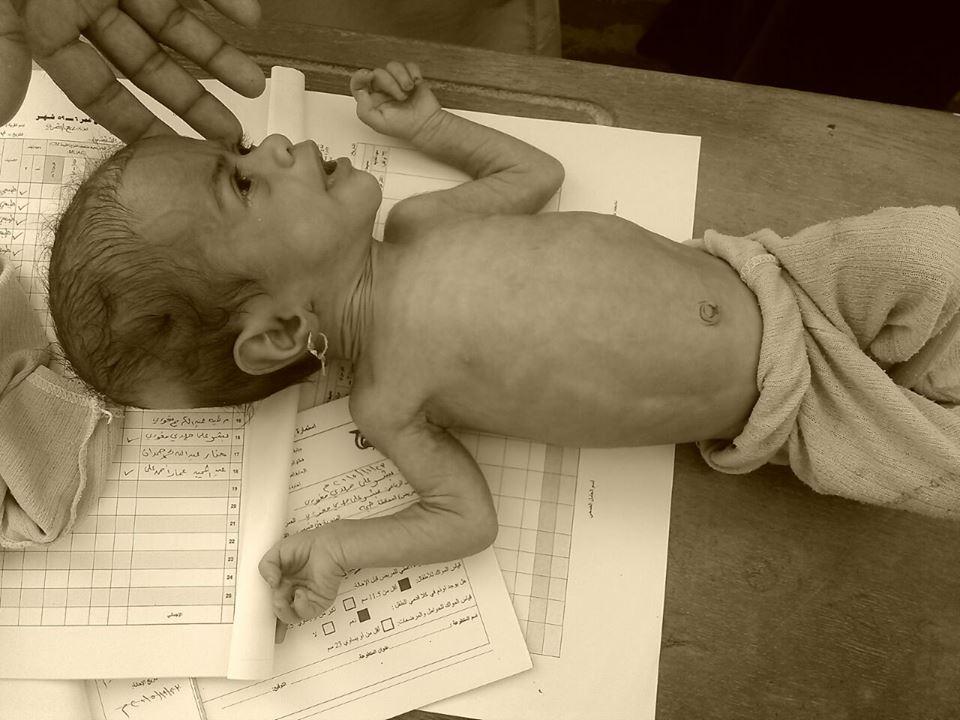
My final question to the Ambassador brings us full circle to the start of this article - the UN involvement in the collective punishment of the Yemeni people, a role they also played previously in Iraq. The Ambassador expanded on the response from the Health Ministry spokesperson:
If we wish to understand the role of the UN in this war, we have to refer to the resolutions on Yemen. Resolutions based on the conditions of the aggression, not on the reality of the catastrophic humanitarian situation in Yemen.
Resolution 2216 has effectively legitimized every punitive measure against the Yemeni people since the beginning of the war in March 2015 - the land, sea and air blockade.
All UN resolutions have had a negative impact on Yemen. We saw nothing but hollow rhetoric from the UN, meaningless appeals to 'lift the blockade' or to open the airport in Sanaa. Thousands of people would have been able to go abroad for medical treatment, thousands of lives would have been saved, thousands died because of this criminal closure of a lifeline airport.
Yemeni ports are subject to aggressive measures by the Saudi coalition, food and medicines cannot enter Yemen without permission from the aggressor countries, not from the UN. (My note: the UN actually ensures further delays through its 'Verification and Inspection' mechanism).
Humanitarian aid destined for the Yemeni people does not reach its intended destination without being pillaged and decimated by UN employees and donor organisations who benefit from an estimated 80% of this 'aid'. Of the remaining 20%, much of the food arrives rotting and inedible, not even suitable for animal consumption. This is the role of the UN in Yemen.
From our perspective, the best of former UN envoys was Jamal Benomar and the worst was Ismail Ould Cheikh Ahmad.
Jamal Benomar was adamant, in 2015, that Yemenis were reaching political resolution and that the Saudi aggression was designed to disrupt Yemeni self-determination.
I was, personally, a member of the political negotiating team. The dialogue took place in the Movenpick Hotel under the supervision of Benomar. One day before the unexpected Saudi aggression, we had agreed on forming a political representative committee, the Presidential committee, which consisted of five members representing the four major political factions - Al Mushtarak (Joint Meeting Party JMP), Al-Mo’tamar (The General People’s Congress Party GPC), Ansarullah and the Southern Movement. The President would be nominated by the four parties. We had agreed on the mechanism and it was presumed that names would be immediately submitted.
This was the day before the Saudi campaign of aggression was launched on the 25th March 2015.
The agreement stipulated that these names should be provided on the 25th March. Ansarullah, GPC, the Arab Socialist Ba’ath Party and the Federation of the Yemeni Popular Forces nominated and agreed upon the former Yemeni President - Ali Nasir Mohammad. The Muslim Brotherhood factions and Nasserists objected, so we postponed the selection process pending the nomination of their preferred candidate. After each party candidate nomination, we decreed that if a decision could not be agreed upon, we would leave the choice to the UN to decide between the two candidates. It must be noted that the majority, in addition to a percentage of the Socialist Party and the Southern Movement, had agreed with our selection, Ali Nasir Mohammad.
The appointment was scheduled for the next day at 12pm. The dawn of the same day, the Saudi coalition began bombing Yemen. Jamal Benomar included these events in his UN briefing but was ignored and the five year campaign to obliterate Yemeni infrastructure, history, culture and heritage began, the five year bloodshed of the Yemeni people began and has continued, unimpeded by the UN, to this day.
What will be the outcome of the US-led war against Yemen and the region?
To conclude our meeting I asked the Ambassador what he believed would be the outcome of these wars being waged in the region, against progressive, socialist leaning, resource-rich nations, by the neo-colonialist alliance dominated by the US and Israel.
It is clear that Saudi Arabia and the UAE want to exit from this war that is a drain on resources but they are not the decision maker - Washington and Tel-Aviv determine the prolongation of this war and will maintain the aggression until their desired agenda is met.
The US assassination of Qasem Soleimani also catalysed change in the region, this criminal act destabilised US supremacy in this region.
Today, we are witnessing the Iraqi people making their own decisions and challenging the US occupation, demanding that the US get out of Iraq. After the US is forced to depart, the balance of power will shift and the US presence in the region will be severely reduced.
All these factors might bring the war in Yemen to an end. I am optimistic that it will end in 2020. The US and Saudi Arabia have attempted to escalate the aggression to get the upper hand in negotiations but the reality is that Yemen has turned the tables on them militarily and their position is weaker than before.
I hope, for the sake of the Yemeni people, that your analysis is proven correct. Yemen deserves peace and stability and to lift from its neck the yoke of US-sponsored Saudi oppression and corruption.

